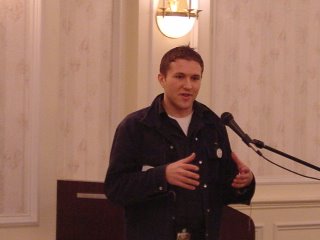Friday, February 16, 2007
Hearing this old name brought some memories from the good old days in New Haven. When I was an undergrad I wrote my senior thesis in Art History on Images of Masculinity and Race in the Early 20th Century Drawings of Hugo Gellert. (Check out his bizarre illustrations of Das Kapital, which are pretty racially provocative for the 1930’s. This image of the peasant, Teutonic? Black? What about the homo erotic workers?). Yeah, that work of scholarship definitely prepared me for life in the real world.
One of the advisers who read my work was a scholar named Kelly Jones. When I asked her how she got into some of scholarship on African-American art, she mentioned her father, LeRoi Jones. It took a minute to put two and two together, to realize that her dad was the Poet Laureate of New Jersey, Amiri Baraka.
He came and spoke at Yale after I graduated to 100 people at the African-American House on campus. His poem, Somebody Blew Up America caused a minor storm when he read it and got a standing ovation. A lot of Jews interpreted it to be reheated, unoriginal conspiracy theory against the Jewish people and Israel. The ADL came out in typical fashion, against something they didn’t seem to fully understand, but smacked of potential anti-Semitism.
The thing is, its much more insidious than that. Baraka’s poem, as I read it at least, isn’t typical anti-Semitism or racist rants. It’s just bullshit. See, a lie is when you know the truth and willfully deceive. The truth still exists in a lie, your just hiding it, or contradicting it. Bullshit, on the other hand, is where you have no regard for the truth. You could be telling it, or not. It doesn’t matter. You are simply putting out speech without regard to any factual claim. That’s where Baraka seems to be coming from in his poem.
He spells out a litany of legit crimes against people and peoples:
"Who got fat from plantations Who genocided Indians Tried to waste the Black nation
Who live on Wall Street…
Who bought the slaves, who sold them
Who called you them names Who say Dahmer wasn't insane..."
These are not minor events, they just ain’t that simple. I wish we could collapse every tragedy in history into a single indictment against evil. I guess if you believe the devil is up to his dirty work in this world, than you can. But if not, than history is complicated and messy.
From my perspective as a Jew, we have a deep interest in bringing truth to bear on racism at work in our society, like the flying of a civil war battle flag over state capitals, or allowing senators and congressmen who ran for office on racist, segregationist platforms to go unreformed, unrepentant and unexamined as they carry on in political life.
And we have an obligation to call to attention the issues of racism and abuse of power in the Jewish homeland. My friend Sasha recently wrote about Israeli/South African military cooperation in the 1970’s. As a Jewish society, there needs to be an open examination of military assistance and investment that Israel provided to the apartheid state. But the fact that Jews have committed their share of wrongs, does not exonerate our adversaries from examination. This is the major pitfall of my colleagues on the left. We assume that because Israeli policy is problematic or just plain atrocious, that this somehow justifies the racism of groups like the ISO. I, for one, don’t think so.
Truth is a fragile thing. Arendt correctly points out that in the struggle of truth and power, truth usually looses.
“The chances of factual truth surviving the onslaught of power are very slim indeed; it is always in danger of being maneuvered out of the world not only for a time but, potentially forever. Facts and events are infinitely more fragile things than axioms, discoveries, theories – even the most wildly speculative ones – produced by the human mind; they occur in the field of ever changing affairs of men. In whose flux there is nothing more permanent than the admittedly relative permanence of the human mind’s structure. Once they are lost, no rational effort will ever bring them back.” The Portable Hanna Arendt. p. 545-576
Facts, like flowers, can be trampled over with ease, and are cultivated with difficulty. Once they’re gone, they are often gone forever.
That’s why the Talmud quotes a verse from the torah portion this week: Keep Far away from Falsehood! (Exodus 23:7), to make this astounding claim about being a judge in a Jewish court:
“…any judge who judges truthfully for even an hour--the verse sees him as if he were a partner of the Holy One in the creation of the world. Here it is written: "And the people stood with Moshe from morning until evening." and there it is written: "And there was morning and there was evening, one day." TB Shabbat 10a.
Being a judge is so precarious, so fraught with the possibility of perverting justice, that even for a learned, righteous person to judge truthfully for an hour, makes a person a partner in Gd’s project. How much more difficult is it to conduct your life with rigorous honesty? It sure seems a lot less pernicious not to lie, but just to disregard to the rigor that truth requires and breeze through with bullshit.




